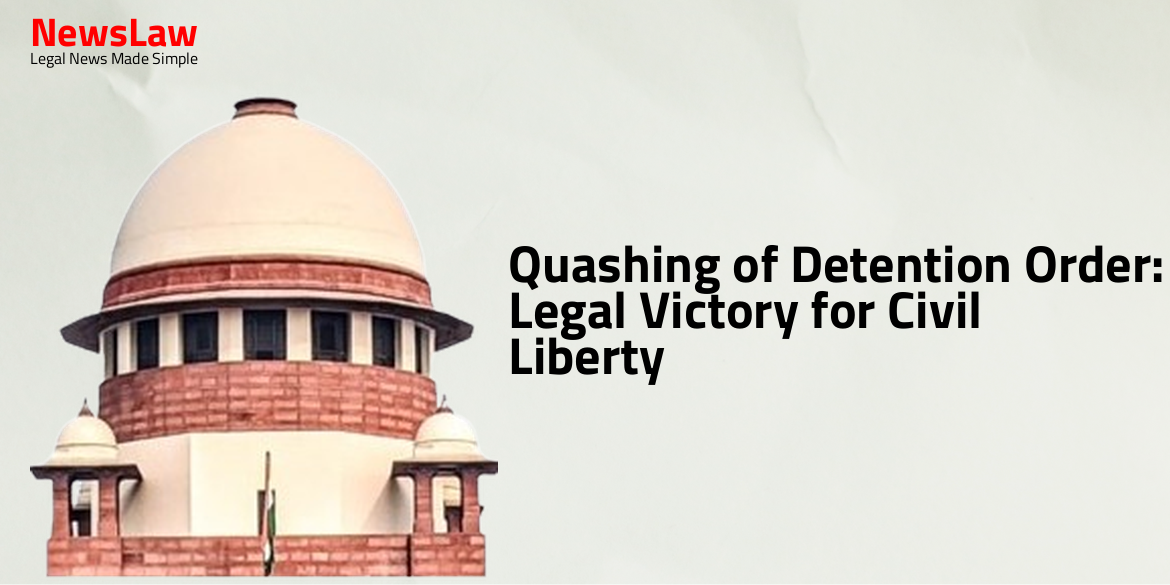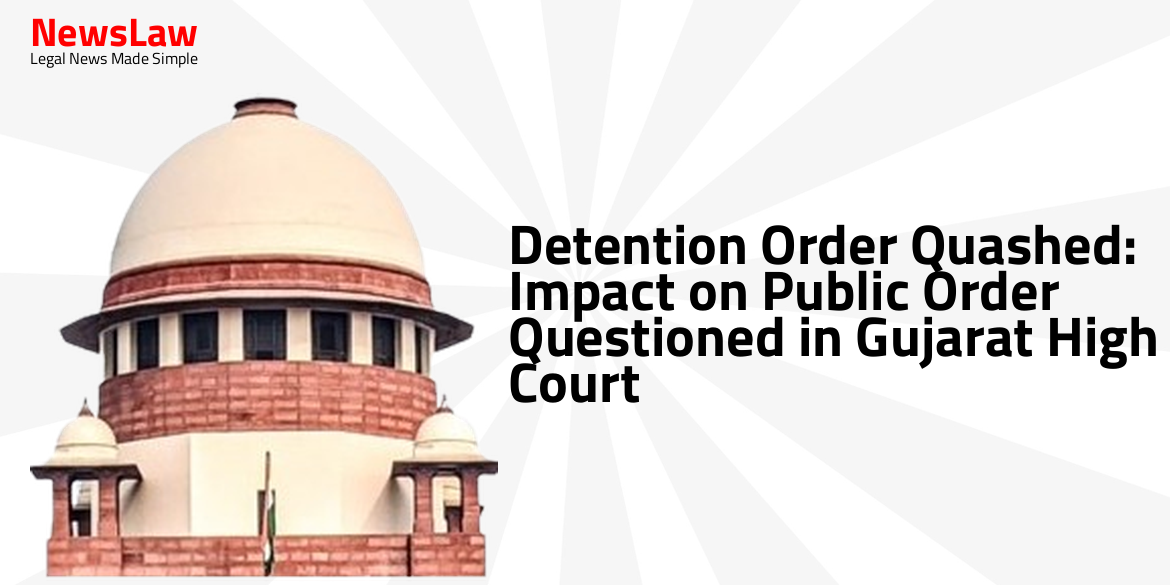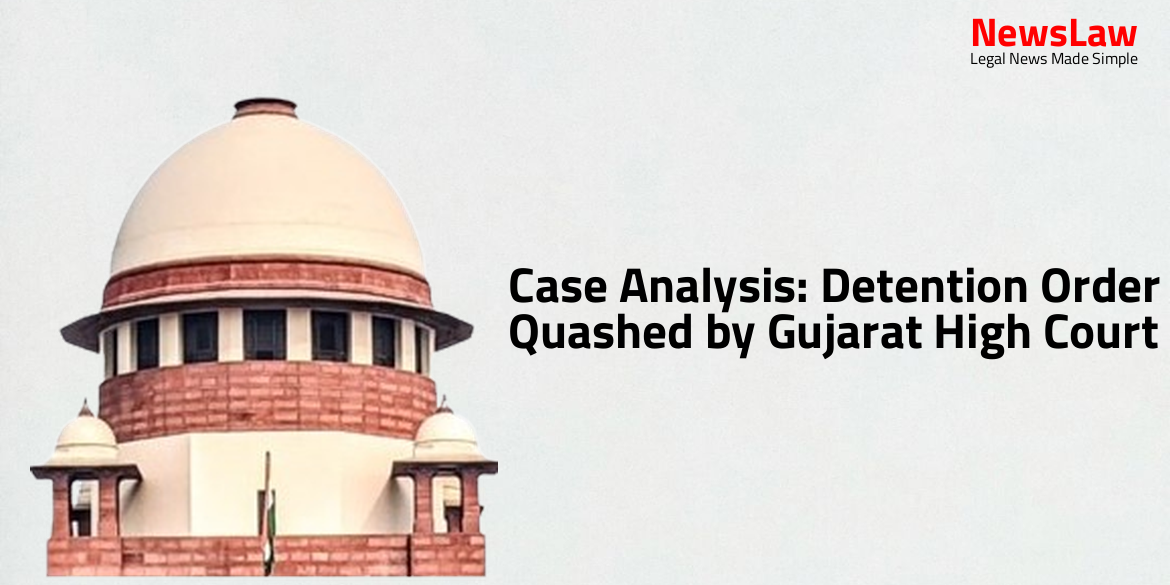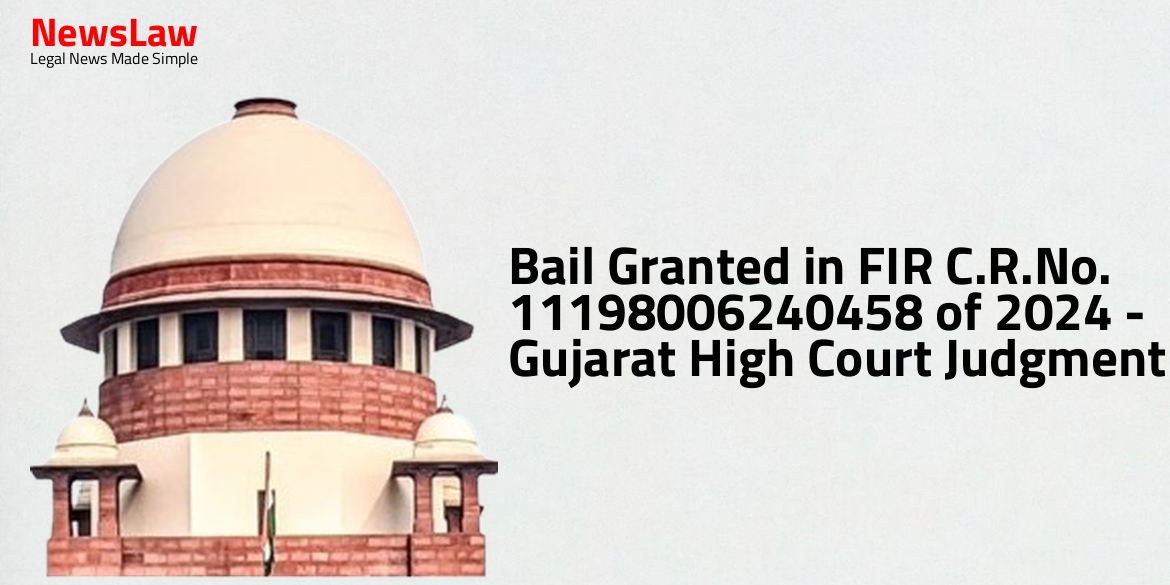In a significant legal development, the Gujarat High Court has quashed the detention order dated 20.01.2024 under the Prevention of Anti-Social Activities Act, ensuring a win for civil liberty. The matter involved the detenue challenging the order, emphasizing the importance of personal freedom and the limitations on preventive detention. The court’s decision highlights the crucial balance between security concerns and individual rights in the case of public order disruptions.
Facts
- The present petition is challenging the order of detention dated 20.01.2024 under the Gujarat Prevention of Anti-Social Activities Act, 1985.
- The detaining authority passed the order under Section 3(1) of the Act against the petitioner.
- The petitioner has been detained as defined under Section 2(c) of the Act.
Arguments
- Activities of the petitioner – detenue with respect to criminal cases did not affect the social fabric of society or disturb public order.
- The registration of criminal cases did not put the social apparatus in disorder or threaten the existence of normal life.
- The detaining authority did not consider that the petitioner was released on bail for all offenses.
- Impugned order of detention based solely on the registration of two FIRs under IPC sections 379 does not meet the criteria under Section 2(c) of the Act.
- Illegal activities alleged do not have a nexus with public order, at most constitute a breach of law and order.
- Lack of relevant material beyond witness statements and FIR registration to show the petitioner’s activities as anti-social falling under breach of public order.
- AGP for the respondent-State supported the detention order passed by the detaining authority.
- Sufficient materials and evidences were found during the investigation and supplied to the petitioner-detainee.
- Detainee’s activities fell under Section 2(c) of the Act according to the AGP.
- Detaining authority’s order was justified based on the facts of the case.
- Subjective satisfaction of the detaining authority was found to be legally invalid by the Court.
- Allegations in FIRs were deemed not related to public order as required by the Act.
- Other penal laws were considered sufficient to address the situation regarding the detenue.
- Allegations against the detenue did not meet the criteria of Section 2(c) of the Act.
Analysis
- The Apex Court emphasizes that preventive detention involves detaining a person without trial to prevent them from committing certain offenses.
- Preventive detention should not replace ordinary law enforcement and investigating authorities must continue their normal functions.
- Preventive detention is typically for a year and should not be used to keep a person in perpetual custody without trial.
- There must be evidence that the individual poses a threat to public order to justify preventive detention.
- Article 22 must be viewed as an exception to Article 21, applicable only in rare and exceptional cases.
- In this case, there was a lack of application of mind by the detaining authority in considering material circumstances.
- The Apex Court in the case of Pushkar Mukherjee and others vs The State of West Bengal, reported in AIR 1970 SC 852, distinguished between ‘law and order’ and ‘public order’.
- Preventive detention powers are exceptional and draconian, meant for disturbances subverting public order, not just law and order disruptions.
- Detention orders should only be based on actions that affect public order, not mere disturbance of law and order like individual assaults.
- The Constitution ensures that preventive detention powers do not become arbitrary exercises of state authority.
- The distinction between ‘law and order’ and ‘public order’ is crucial, with public order disruptions affecting the community at large.
- The personal liberty protected under Article 21 is considered sacrosanct and of high value in the constitution.
- It is the duty of the detaining authority to prove that the detention follows the established legal procedures.
- Merely registering FIRs does not necessarily indicate a breach of public order under the Act.
- The court is inclined to allow the petition based on the lack of nexus between FIR registration and public order maintenance.
Decision
- The petitioner-detainee is ordered to be set at liberty forthwith if not required in any other case.
- Direct service is permitted.
- No other relevant and cogent material exists for invoking the power under Section 3(1) of the Act.
- The present petition is allowed.
- The impugned order of detention dated 20.01.2024 passed by the respondent – detaining authority is quashed and set aside.
Case Title: BHARAT S/O BHAGAT @ BABUBHAI RATHOD THROUGH RAJESH BABUBHAI VAGRI Vs. STATE OF GUJARAT
Case Number: R/SCA/6669/2024



